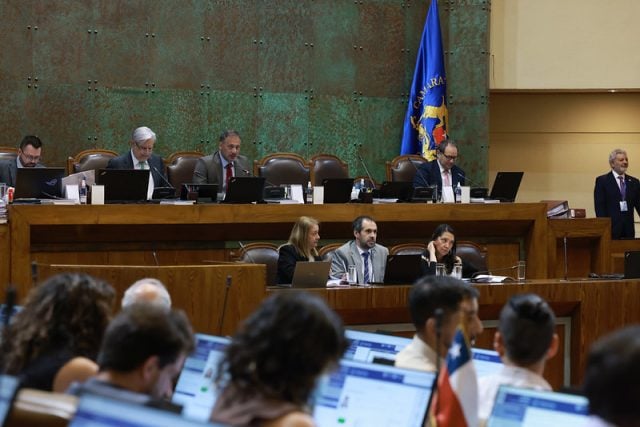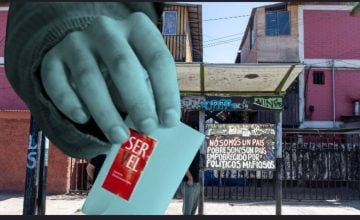Deputy Alejandra Placencia (PC) called for historical memory and warned that a possible government led by the far right could roll back hard-won democratic rights—especially those protecting women and workers.
“The advance of the far right, which in this case could be José Antonio Kast—who is currently leading in the polls—is a danger to society as a whole,” said the lawmaker and District 10 re-election candidate on Monday in an interview with the program La Mañanera.
The president of the Chamber of Deputies’ Committee on Women and Gender Equality reflected on the long struggle for rights since the end of Augusto Pinochet’s dictatorship to the present day.
In that context, she pointed to “everything we’ve won through great effort,” noting that Sunday, October 5, marked 37 years since the plebiscite in which the “No” vote prevailed—an outcome, she said, that emerged from organized social mobilization and ultimately restored democracy.
“We must remember. These actors (the far right) are proposing rollbacks that are unacceptable in a democratic society. Along with that comes a threat to the rights won by workers, and a clear danger for women,” she stressed.
“They’ve said it plainly. In a recent forum with other candidates, we were given proposals on inclusive education, and they advocated eliminating the Ministry of Education and the Ministry of Women to create a single mega-ministry—one that ignores specific needs and proven, targeted public policies in areas that are crucial in our country,” she explained.
For Placencia, that approach would represent a step backward on justice and human rights.
“Such a setback is unthinkable if we want to keep advancing in justice, rights, and national stability—and to invest resources where they’re truly needed. For women, it’s undeniable: they’re not only talking about scrapping the Ministry of Women, but dismantling the public policies behind it,” said the philosophy teacher and feminist.
She recalled that the Ministry of Women has driven key initiatives such as the Parental Responsibility and Effective Child Support Payment Law—known as the “Papito Corazón” law—which established a permanent mechanism to collect child support arrears for each of a debtor’s children.
She also highlighted the Comprehensive Law on Violence Against Women, “which already recognizes different forms of violence and requires our legislation to evolve—this is long-haul work,” and pointed to the bill to decriminalize abortion without specific grounds, which “would establish legal abortion up to 14 weeks.”
Jeannette Jara: A Platform Built on Dialogue and Broad Consensus
Amid the risks she associates with a possible far-right government, Placencia emphasized the candidacy of Unidad por Chile’s Jeannette Jara as a solid, collectively built alternative.
“First, Jara’s candidacy—as we’ve already seen—stands apart from the rest. It’s backed by a very broad political and social coalition,” she noted.
“That means making concrete, meaningful efforts to coherently incorporate diverse perspectives, so we can present the country with a future-focused governing project—not only to address urgent needs, but to ensure long-term governability.”
Regarding the government platform presented by the former Minister of Labor and Social Security, Placencia said it aims to “reflect the diverse needs of our country” through “very concrete measures.”
“I invite everyone watching to take a look. It’s organized by measures, by policy areas, by thematic pillars. That makes it much easier to understand,” said the candidate for District 10 in the Metropolitan Region, which encompasses Ñuñoa, Providencia, Santiago, Macul, San Joaquín, and La Granja.
The social activist underscored that Jara’s platform was built through a democratic process with citizen participation that extended across the entire country.
“All of this went through a series of dialogues nationwide. None of the other candidates undertook this exercise, which I believe is one of the most democratic ways to truly understand needs and urgencies—and, crucially, to propose concrete measures in response,” she emphasized.
Gender Perspective and Economic Autonomy
From her role leading the Committee on Women and Gender Equality, the deputy linked the committee’s priorities to the feminist vision guiding Jara’s presidential bid.
“We’ve seen a wide spectrum of issues affecting women due to the structural inequality in our country. In the world of work, for instance, we need better conditions and a national care system that supports autonomy and self-care—especially for caregivers whose labor is often silent and invisible, leading to burnout and a lack of state recognition. That’s a debt we need to pay. We want women to achieve economic autonomy,” she said.
“That’s crucial right now. Caregivers struggle to be economically independent. Women face pay gaps, and many who singlehandedly support their families are penalized. On top of that, many fathers—mostly men—fail to pay child support,” she added.
She also called for stronger action on “violence, domestic violence, and gender-based violence—often overlooked in public debate—even though it is the most common crime in our country.”
Adjustments to the Child Support Law
Addressing child support debtors, Placencia outlined a bill she introduced to make enforcement measures more effective.
“Yes, I filed a bill because the current law includes certain sanctions designed to pressure the debtor—primarily men—to pay, including preventing them from obtaining or renewing driver’s licenses,” she said.
“This isn’t about taking away someone’s ability to work as a driver or for ride-hailing apps, for example. If they need a license to work, a court can authorize it—but only with a payment commitment. The Office of the Comptroller General found that 70% of municipalities still issued licenses anyway. So we’re introducing adjustments to require periodic reviews, cancel licenses issued in violation of the law, and revoke valid licenses for those who enter the debtor registry. If they need to keep working, they must go to court and request authorization with a payment plan. The priority is that children receive the support they are owed,” she stressed.
On public safety—central in her District 10—Placencia criticized “populist” proposals and advocated for a territorial equity approach, contrasting it with the track records of right-wing mayors Mario Desbordes in Santiago and Sebastián Sichel in Ñuñoa.
Regarding her relationship with both mayors, the lawmaker said it “has been limited.” She nevertheless highlighted the “very close relationship” she has built “with other local authorities, such as municipal councilors and regional councilors,” noting “they are the ones we work with most closely on community issues.”
“The hallmark of our office is that legislative and oversight work is tightly linked to on-the-ground needs. We do neighborhood walk-throughs, dialogue, listening, and joint problem-solving to address issues that matter to communities—often when authorities don’t listen. We make ourselves available to workers in the district—in education, health, housing—advocating and collaborating. The same goes for caregivers, who are numerous and now increasingly organized. And on security, through the Security Commission I’ve served on for years, that community link is essential: you can’t make coherent public-safety decisions without knowing realities in each neighborhood,” she said.
Asked about “populist” measures floated in Congress by right-wing presidential hopefuls—policies that, she argued, ignore vastly different realities within District 10, such as Providencia versus La Granja—Placencia said the uneven presence of the state across municipalities reveals “a lack of territorial equity.”
“That’s the core issue we must tackle: leveling up with territorial equity—ensuring security policy allocates resources fairly, strengthens state capacity, and puts support precisely where it’s needed,” she emphasized.
Placencia offered a concrete example: “This weekend I was in La Granja meeting with leaders from the Malaquías Concha neighborhood, and many women told us there’s no victim assistance center. Women facing various forms of violence—and neighbors harmed by other crimes—need support, not only in the courts, which is important because most people can’t afford a lawyer, but also psychological care and emotional support.”
She also pointed to systemic problems: “We know that, too often, the first response at a Carabineros station isn’t appropriate. We’ve even learned of situations where victims are discouraged from filing a report. That’s unacceptable—it fosters cover-ups and a sense of impunity and injustice for women. We must fix it.”
Given this reality, she said it’s critical to create spaces to listen to communities “because they live these situations every day, and authorities must be responsive to those demands.”
“In other words, the community—and all of us—should insist that public authorities in charge of policy decisions allocate resources and do the work where the need is greatest,” she said.
Nepotism in Kast Jr.’s Candidacy?
Asked whether nepotism is at play in the nomination of José Antonio Kast Jr. as a congressional candidate in Chile’s most populous district, Placencia attributed it to branding and financial firepower.
“There’s no doubt they’re leveraging a brand—the Republican label and the Kast surname. The right has long done this, and they have the economic machinery to flood campaigns with money. You can see it,” she said.
Even so, she expressed confidence that voters will weigh candidates’ records when they cast their ballots.
“Beyond that, as the election nears, people are looking closely at who seeks to represent them and at their track records. That’s why it’s important to highlight Jeannette. She stands out for her experience and her story, and those of us who share that approach believe we can give the public certainty and real possibilities for change. We’re not inventing credentials or relying on family name recognition,” she said.
Placencia’s Campaign Priorities
As the campaign heads into its final stretch, the deputy listed priorities she believes should lead the agenda—aligned with Unidad por Chile’s candidacy.
“For us, guaranteed social rights are central—easing the strain on family budgets. We know how expensive it is to live in Chile, and that most people work long hours for low pay. We must ensure quality of life. Security, as an enabling right for exercising other rights, is key—and I’m encouraged that Jeannette Jara offers concrete nationwide measures on that front.”
“Second, health. We need better health infrastructure, more professionals, and a strong focus on preventive care as a central pillar. Housing is another priority: we’re working to make a land bank a reality, and Jeannette includes it in her platform. On women’s rights, we want every woman to build a life project and fully exercise her rights—with economic autonomy, including sexual and reproductive rights. And then there’s care work, long invisible, now finally recognized as work. Jeannette proposes recognizing caregivers and restoring their dignity,” she said.
Placencia concluded by reaffirming her commitment to a project that, unlike what she sees from the far right, seeks to advance rights rather than roll back hard-won gains.
Monday, October 6’s broadcast also featured an interview with Ecuadorian social activist Vanessa López about the nationwide strike led by Indigenous communities over the past two weeks in response to President Daniel Noboa’s decision to eliminate the diesel subsidy.
You can watch the full program below:











